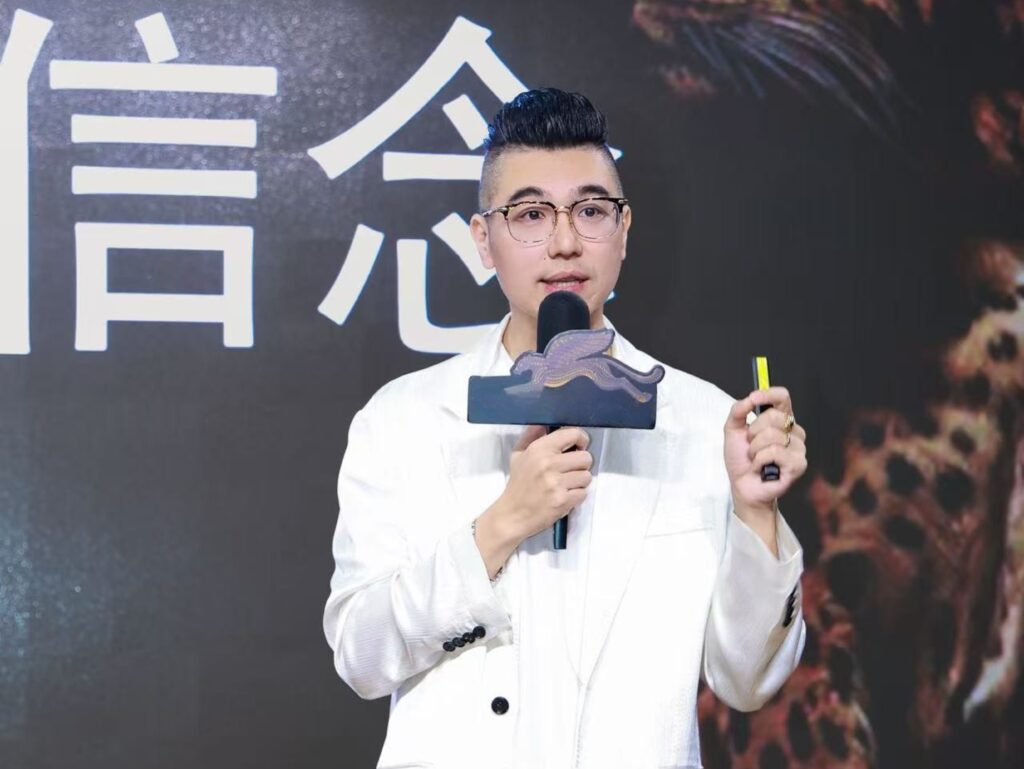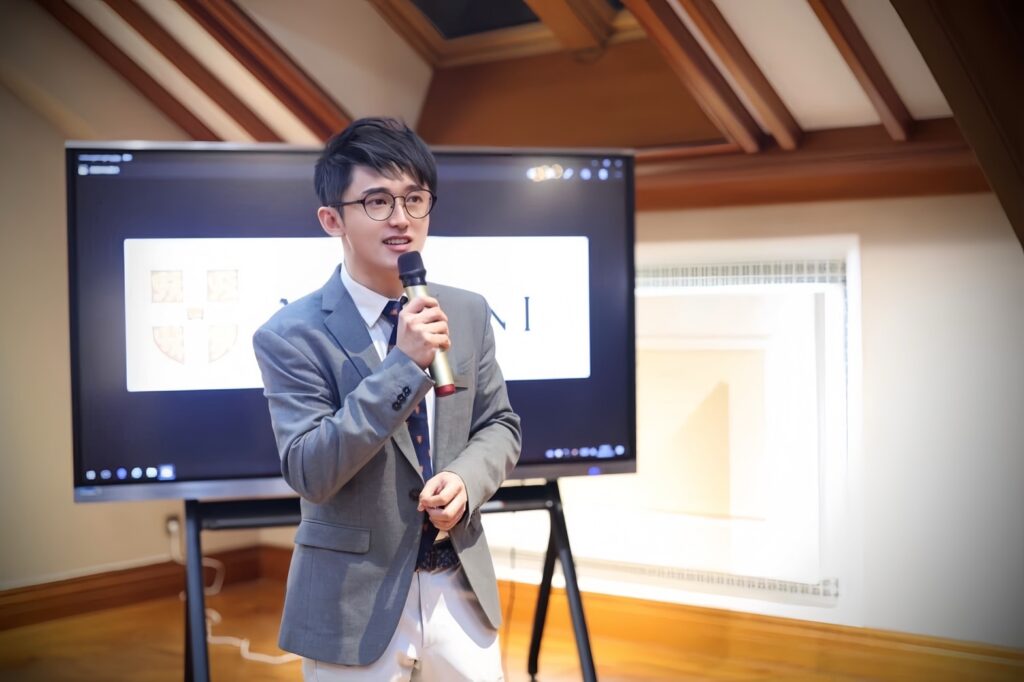In an era where the global economy is marked by profound uncertainty, competition among enterprises is no longer confined to products and capital. Increasingly, it is shifting towards a contest of leadership influence. As the relationship between business and society continues to be reshaped, the personal influence of corporate leaders is emerging as the most decisive strategic asset for the next decade. This influence goes beyond the traditional notion of a “personal brand” or local reputation; it determines whether leaders can earn international trust and secure a place on the global agenda.
On 2 September 2025, BAOBIAN Academy, based in Beijing and long recognised for serving prominent Chinese entrepreneurs, investors and cultural figures, joined forces with The Icons, a London-headquartered global media group dedicated to sustainable leadership influence, to host a dual-city forum held simultaneously online and offline across Europe and Asia.
At the forum, BAOBIAN IP Founder and Academy President Bean Chang and The Icons Founder and CEO Harry Hsu, both leading experts in leadership IP, convened entrepreneurs from East and West for an in-depth dialogue. Together, they examined how leaders can transform their personal value into lasting influence in an age defined by artificial intelligence, while also presenting forward-looking predictions on the evolution of leadership IP in the decade ahead.
“The essence of all business lies in relationships, and personal IP is the key instrument for restructuring these connections. It redefines how trust is built, shapes the choices of collaboration, and even dictates the flow of capital and industrial resources,” explained Bean Chang, who has pioneered the concept of personalised business. He stressed that in today’s market, whether in finance, industry partnerships or cross-sector collaboration, everything ultimately hinges on human connection.
“When a leader’s personal IP is distinct and credible, it not only reshapes existing business networks but also opens new channels of trust, enabling enterprises to access higher levels of cooperation and resource flow.”
Harry Hsu, who specialises in creating cross-cultural IP value and steering international influence for leaders, expanded on this perspective. He highlighted that if “relationship restructuring” is the foundation, then leadership IP constitutes a complete and self-sustaining system. This framework incorporates persona diagnosis, asset leverage, influence design and the construction of international discourse power, allowing leaders to transform their personal value into organisational assets that gain both recognition and trust on the global stage.
“In the decade ahead, leaders without an IP system to support them will gradually lose market trust and be excluded from international cooperation. Conversely, those who succeed in building a comprehensive IP framework will be able to consolidate national reputation, transcend cultural and industrial boundaries, and win enduring recognition from capital, industry and society worldwide.”

Leadership IP Is Not Just a Brand, but a System of Trust
In the dialogue, The Icons Founder Harry Hsu highlighted the essential difference between leadership IP and personal IP. While personal IP often remains at the level of visibility and image management, leadership IP operates as a designed and functioning trust mechanism. “Its core purpose is not simply to make you visible, but to ensure that at critical moments you are the one chosen,” he explained. A successful leadership IP enables leaders to become the trusted counterpart in capital negotiations, international collaborations or family succession.
Hsu elaborated that the formation of leadership IP is a process of transformation. It begins with extracting the leader’s values and ethos into clear signals, then leveraging these into assets perceptible to enterprises and investors. Through consistent language and narrative, these signals transcend cultural boundaries and ultimately crystallise into international trust. “Leadership IP converts personal influence into organisational assets and secures a stable position within the global order,” he emphasised.
He added that this logic is particularly evident on the international stage, where large investment institutions and multinational corporations often assess the influence of leaders and senior executives before reviewing financial reports or product details. “In such contexts, IP becomes a shortcut to trust. It can replace lengthy due diligence and determine whether you are invited to the negotiating table,” Hsu noted.
From the perspective of China’s market, BAOBIAN Academy Founder Bean Chang observed a similar shift. He explained that while IPs built on exposure and popularity remain superficial, those aligned with industrial narratives, policy directions and capital needs are swiftly moving into the inner circles of influence. “A distinctive and credible IP significantly enhances collaboration efficiency. It raises the threshold for entry, filters partners by shared values, and accelerates decision-making because once trust is established, stakeholders are more willing to commit resources,” he said.
Chang further outlined three evolutionary stages of IP development in China. The first stage is the “celebrity IP,” driven by visibility and traffic. The second is the “strategic IP,” aligned with capital flows and policy priorities. The emerging third stage is the “nodal IP,” which extends beyond the individual to act as a hub for cross-sector resource allocation and network restructuring.
He also noted that in China’s capital markets, many investors begin not with business plans but with assessments of the founder’s past, present and even projected influence. If the impression is negative, due diligence often never starts; if positive, collaboration can advance with surprising speed. “A founder’s IP can determine more quickly than any business plan who gets the first opportunity to speak with investors. These shifts show that leadership IP in China is moving from type-based evolution to market-level upgrading, a trend now reshaping the rules of engagement across both Eastern and Western markets,” Chang concluded.

Leadership IP Is Redefining the Rules of Eastern and Western Markets
From his observation of the international stage, The Icons Founder Harry Hsu underlined that the benchmark for IP has long moved beyond its mere existence. What now matters is whether it can be accepted across different cultures and systems.
He pointed out that some leaders, by building a clear and credible IP, not only attract capital but also represent industries, and in some cases even nations, on global platforms where rules are made. Others, despite having solid companies and advanced technologies, find themselves excluded from core networks because their IP is vague or misaligned with international values.
Hsu noted that this logic is already well established in Western capital markets. In the ESG investment space, for example, many funds look beyond carbon metrics to assess how CEOs or founders present themselves publicly on sustainability issues. In Silicon Valley, investors frequently review leaders’ published thought pieces, international speeches and records of cross-sector collaboration as indicators of whether they are trustworthy long-term partners. At the Cambridge Science Park in the UK, investors may even evaluate whether founders consistently contribute to open-source communities or speak at global technology forums as part of their judgement on leadership potential. Across Europe, several energy CEOs have secured both capital support and seats at EU policy negotiation tables precisely because of their visible commitment to sustainability and their role in shaping industry standards.
These “soft indicators” are already influencing the flow of capital and are gradually being integrated into due diligence processes. As Hsu remarked, “In the international arena, without IP you cannot even enter the room. With the wrong IP, you will be shut out of the agenda. In the context of global competition, IP is not merely a ticket to speak; it determines whether you remain a participant or rise to become a rule maker.”

Adding perspective from the Chinese market, BAOBIAN Academy Founder Bean Chang observed that the country’s understanding of IP is undergoing a clear “upgrade”. In its earlier stages, influence was often built on visibility and traffic, with celebrity appeal and fan economies once regarded as shortcuts to commercial success. Yet as capital markets and industrial chains have matured, traffic-driven IP alone can no longer gain entry into the core circles of influence.
“Investors and industry partners increasingly recognise that only IP aligned with industrial narratives, policy directions and capital demands truly carries market value,” he stressed. This, he added, explains why many entrepreneurs and next-generation successors are no longer satisfied with social media popularity. Instead, they are systematically building IP that matches enterprise strategy. “This shift signals that IP in China is moving from entertainment-driven to capital-driven, and this step often determines how far a leader can go.”
The Next Decade: IP Will Evolve from a System of Trust to the “New Balance Sheet” of Global Rules
BAOBIAN Academy Founder Bean Chang observed that the arrival of the AI era will fundamentally reshape the way IP survives. In the past, visibility and exposure could quickly generate reputation, yet such IP often struggled to withstand the pressures of algorithms.
“AI magnifies without mercy, but it also eliminates with equal speed. IP without genuine value at its core will become nothing more than fuel for algorithms, while only those aligned with industrial narratives, policy directions and capital demands will be chosen by the times,” he remarked.
Chang pointed to a striking contrast already evident in the Chinese market. Some entrepreneurs who rose to fame through short videos were swiftly discarded as algorithmic tides shifted. In contrast, business leaders who are deeply embedded in industrial value chains and aligned with policy priorities are the ones consistently recognised by capital, even amid volatility.
“In the decade ahead, leadership IP in China must possess two defining qualities: durability and replicability. Durability ensures it can endure market fluctuations over the long term, while replicability allows it to be continuously disseminated across platforms and contexts. This means IP will no longer be a one-off burst of visibility, but a long-term strategic asset resilient to algorithmic turbulence,” Chang concluded.

Harry Hsu, Founder of The Icons, brought the discussion to the international stage. He noted that as cross-border capital and collaborative networks deepen, IP is entering a new phase in which it becomes measurable and tradable, effectively a company’s “second balance sheet”.
“In the near future, investors will not only review financial statements but also examine a leader’s ‘IP report’. This will not be about accounting figures, but about the leader’s values, global reputation and cross-cultural trustworthiness,” Hsu observed. He argued that this shift would transform IP from something intangible into a hard metric, gradually embedding its influence into company valuations.
Hsu also sketched a possible scenario: in time, a company’s “IP report” may sit alongside its financial accounts, comprising three core indicators: a Global Trust Index (derived from surveys of confidence in leaders across different markets), a Cross-Cultural Acceptance Rate (the adaptability of IP across diverse contexts), and an International Agenda Participation Score (a measure of whether leaders are visible and effective in shaping global debates). Once quantified, such data would not only provide investors with a new basis for decision-making but would also elevate leadership IP into a tradable and valued asset.
Looking ahead, Hsu emphasised that the ultimate competition will not be over capital but over rules. As global agendas such as ESG, AI governance and industry standards accelerate the creation of new orders, the leaders whose IP resonates with these agendas will be the ones positioned to shape them.
“Trust is the starting point of IP, but in the decade ahead it will be regarded as a form of global currency. Without IP, you will be ignored; with the wrong IP, you will be excluded. Only a well-designed system that can transcend cultural boundaries will allow you a seat at the table where the rules of the future are written,” Hsu concluded.

Recommend for you: